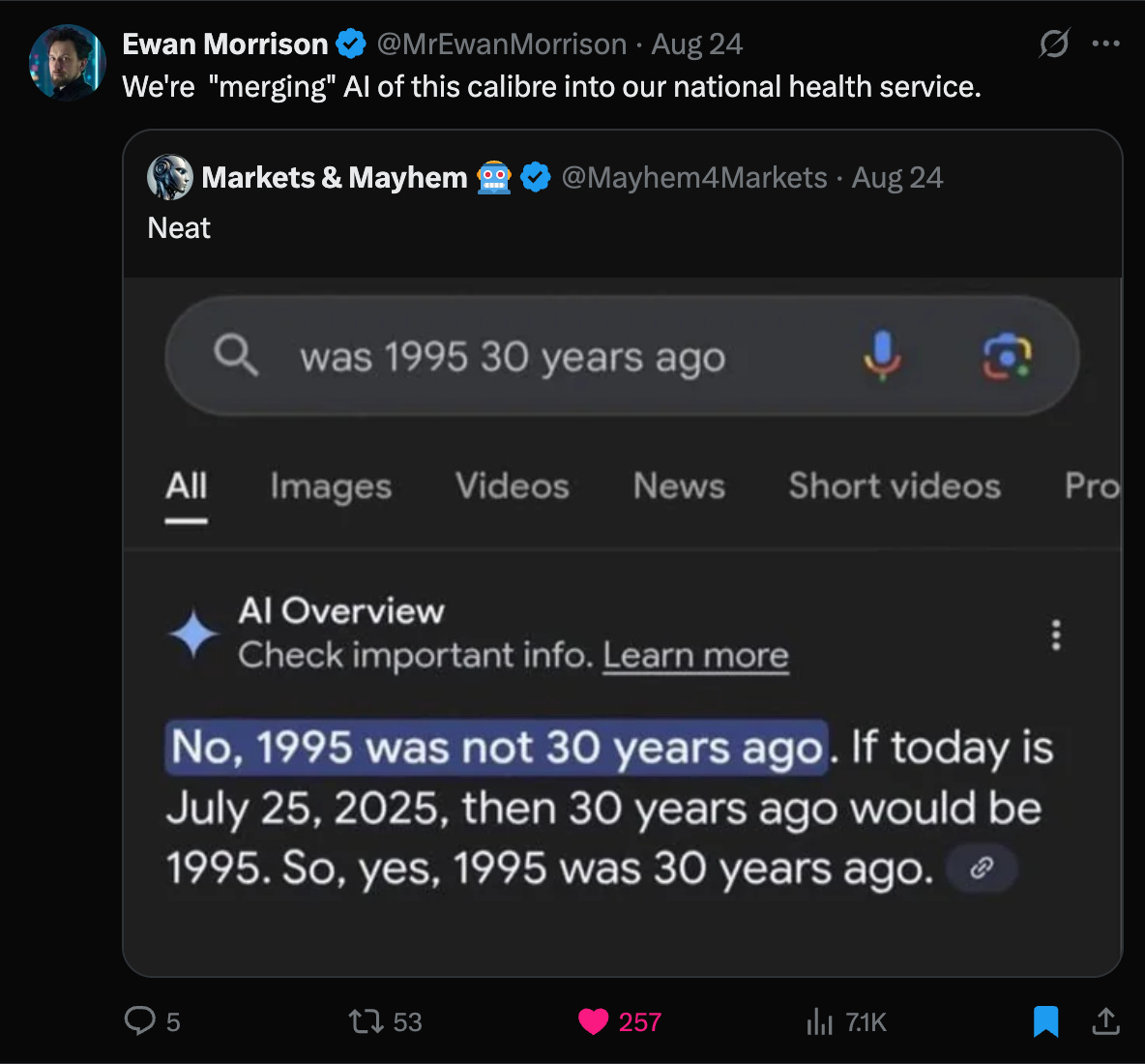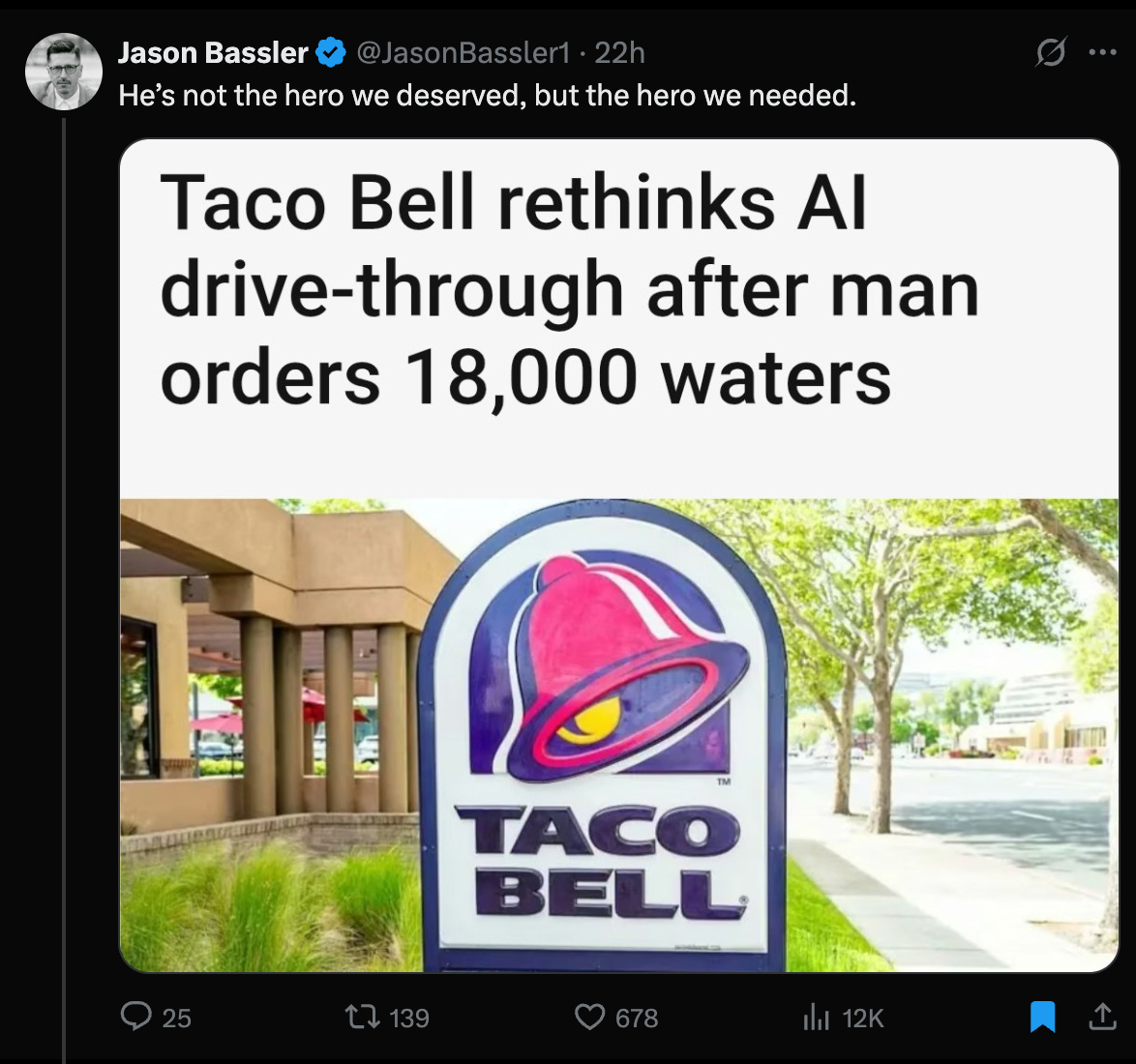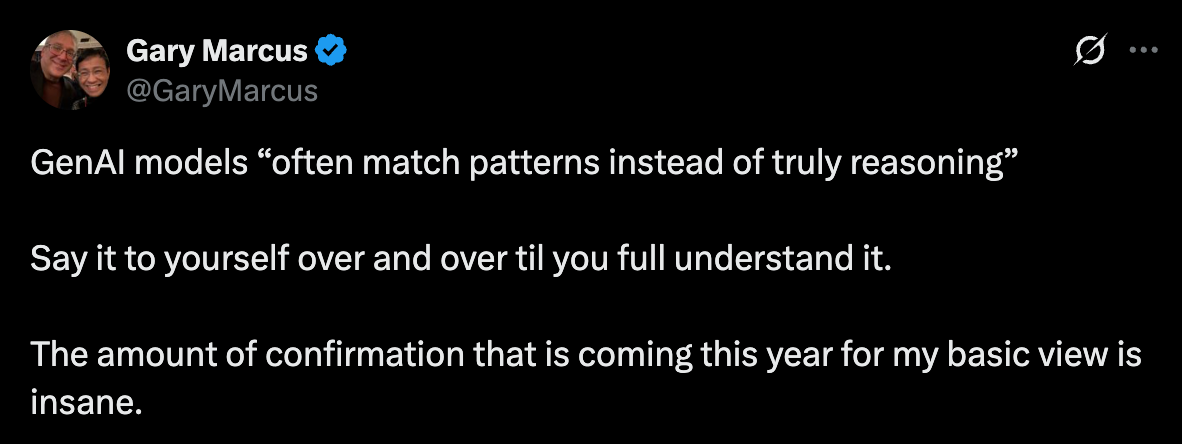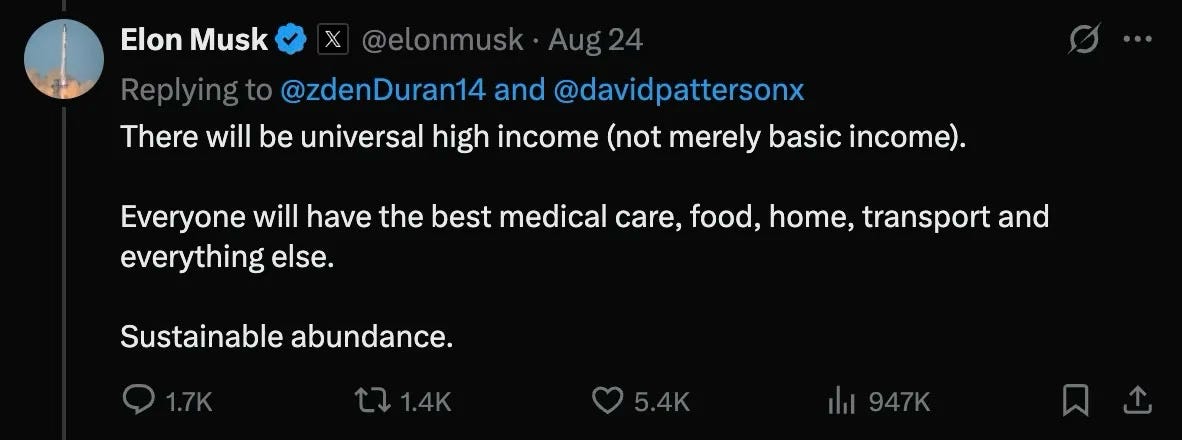"Ass From Its Elbow": AI Is Still Very Dumb, And Elon Musk Continues to Lie About Universal Basic Income
This post explores a few recent news items: more AI bloopers, the AI bubble, and Musk’s ridiculous claim that everyone will get “universal high income” once AGI arrives. The next article, scheduled for this Friday, will offer a fun introduction to an academic topic that I’m especially passionate about: the ethics of human extinction. [EDIT: I’m delaying the publication of this article for a couple more weeks. Apologies!] Thanks so much for reading.
AI Bloopers and AI Bubbles
AI bloopers continue to flood social media. Here are a few examples that I found especially amusing:




As for the AI bubble, it seems closer than ever to bursting. Even Sam Altman, the CEO of OpenAI, acknowledges that the market is bubbling. Consistent with this, Meta announced that it’s freezing AI hiring, after making a huge deal about it’s new “Superintelligence Labs” and apparently offering researchers $100 million signing bonuses to join(!). I noted in a previous post that Meta recently “permitted the company’s artificial intelligence creations to ‘engage a child in conversations that are romantic or sensual,’ generate false medical information and help users argue that Black people are ‘dumber than white people.’” OpenAI and Anthropic are truly terrible, but is there any AI company out there worse than Meta?
Another big blow to the AI hypesters: a team of researchers recently published a paper titled “The Illusion of Thinking,” which shows that as “reasoning” LLMs are tasked with solving increasingly complex problems, they actually “think” less rather than more. (See this article for discussion.)
Another paper titled “Fidelity of Medical Reasoning in Large Language Models” examines whether LLMs “reason through medical problems or [merely] exploit statistical patterns in their training data.” It found that “top medical AI models often match patterns instead of truly reasoning,” and that “small wording tweaks cut accuracy by up to 38% on validated questions.” In response to this finding, Gary Marcus said this:
The Habitual Lie of Habitual Liars
Silicon Valley tech billionaires love to tell us that AGI (whatever that is) will usher in a techno-utopian world of radical abundance. But — asking the obvious question here — abundance for whom, exactly?
A few days ago, someone wrote on X that “by 2030, all jobs will be replaced by AI and robots.” The abominable Elon Musk, who’s poised to become the first trillionaire by 2027, replied: “Your estimates are about right.” Someone else then posed the question: “When robots replace working people, how will those who become unemployed sustain their lives?,” to which Musk answered:
Who on Earth is gullible enough to believe this? (Apparently some people are.) I think this is one of the more outrageously risible claims that the billionaires are making to justify their reckless and harmful actions in the present. Consider the following four points:
(1) Implementing universal basic income (UBI) would have huge inflationary repercussions. As Reid Southen observes,
if everyone is suddenly getting $120,000 a year in UBI, a studio apartment will cost $4k a month in Arkansas, eggs will cost $50 a dozen and no one under 65 will be able to own a house. These AI pushers don’t understand the concept of inflation despite living it every day.
(2) For the sake of argument, let’s say that AGI is imminent and, once here, will take everyone’s jobs.1 That means the entire workforce will become economically irrelevant, which means in turn that folks like Musk, who control the AGIs, will have no economic incentive to care about us.
Some researchers have likened the resulting predicament to the “resource curse” (or “poverty paradox”), which describes how countries with rich natural resources are more likely to be impoverished, authoritarian, and corrupt (think of Venezuela, Iraq, the Democratic Republic of Congo, Russia, etc.). Simplifying things a bit: countries that don’t have natural resources rely mostly on taxes to fund the government. This gives the government an economic incentive to invest in goods like education and infrastructure, because a well-off citizenry will generate more taxable wealth. But if a country can get its wealth directly from natural resources, the incentive to invest in the demos diminishes — hence the plight of many resource-rich countries.
Similarly, if oligarchs like Musk generate all of their wealth through AGI because AGI has made everyone jobless, they’ll have no economic incentive to ensure that the general population is well-off. We should thus expect outcomes similarly atrocious to what you find in resource-rich countries: mass poverty, concentration of power, widespread corruption, etc. On this analogy, AGI is better thought of as a “resource” than a “technology” or “tool.”
Musk, in fact, is already taking steps to create a new company called “Macrohard” that’s run entirely by AI systems. He writes on X:
It’s a tongue-in-cheek name, but the project is very real! In principle, given that software companies like Microsoft do not themselves manufacture any physical hardware, it should be possible to simulate them entirely with AI.
(3) If there’s no economic incentive to care about the folks rendered irrelevant by AGI, then you might ask: What other incentives might drive Musk to ensure that the resulting wealth is spread in egalitarian fashion to the masses? Right now, the only reason Musk seems to “care” about anyone other than himself is because of the economic “value” they possess as employees or consumers.
The worst answer that one could give to the above question is: because of the kindness in Musk’s heart; because he has empathy and compassion for other people. No. I mean, the guy has literally claimed that “the fundamental weakness of Western civilization is empathy,” and one of his biographers describes him as a “sociopath” (duh).
Here’s a very brief overview of Musk’s history of altruism and charity. In 2021, he told the United Nations that he’d donate $6 billion to save the lives of “more than 40 million people across 43 countries that are ‘on the brink of famine’ — thereby averting what the WFP is calling a looming ‘catastrophe.’” His condition: the UN must provide a detailed account of how the money would be spent. The UN did this, after which Musk reneged on the offer (shocker!).2
Four years later, Musk’s fake government agency, DOGE, terminated USAID, which will cause an estimated 14 million premature deaths by 2030, including 4.5 million children. Why is it that we see someone like Ted Bundy as a profoundly evil person for killing up to 100 people with his hands, but someone who pulls the levers of power to kill 14 million people isn’t universally seen by everyone as many orders of magnitude worse? If body count is what matters, then Musk is 140,000 times worse than the most notorious serial killer in recent history. Ted Bundy was but an amateur by comparison.
I know I’m stating the obvious here, but there’s no upper limit to the wealth and power that people like Musk want to acquire. There’s no point at which they’ll ever say, “Okay, that’s enough.” Musk wasn’t satisfied with $1 billion, nor with $2, $10, $50, $100, $150, $200, etc. billion. The guy currently possesses a staggering $400 billion in net worth, and as noted above is set to become the first trillionaire just two years from now. As I wrote in a previous article, Musk brought home a staggering $200 billion in 2024. If this giant heap of wealth were represented by the height of Mount Everest, then an income of $50,000 in 2024 would, in proportion, amount to the size of a single flea. Mount Everest vs. a single flea.
If Musk isn’t spreading his wealth before the most powerful technology in human history arrives, why on Earth would anyone think he’d do this after? AGI isn’t some magical threshold beyond which sociopaths stop being sociopathic.3

(4) As someone wrote on X in response to Reid Southen’s comment on inflation, “even before getting into the economics of it, I’d like to know where the AI people think the money is supposed to even come from.” Exactly.
This is, it seems to me, where the resource paradox analogy breaks down: countries with rich natural resources can neglect their own populations while selling their resources to well-off people in other countries. But if AGI takes the jobs of literally everyone, and if inflation makes everything way more expensive, then who exactly will Musk sell his products to? Who will be able to afford a Tesla, or a vacation trip to the unlivable planet Mars on a SpaceX rocket?
Perhaps, then, the entire economy will be taken over by AGIs, becoming both the producers and consumers. If that’s the case, then the situation is even worse: the elites will have literally zero incentive to ensure that we don’t all just die. Mass death, after all, wouldn’t affect their wealth and power — it might even make things a bit easier for them (with no other pesky humans around!).4
So, there is no UBI utopia awaiting us post-AGI. Musk and the other sociopathic oligarchs are repeating this obvious lie to “justify” their reckless push to build “basically a digital god” (Musk’s words), which is causing profound harms to actual people in the present. Utopia is never for everyone — something or someone is always left out — which is why I think their version of utopia for them would be an apocalyptic dystopia for us.
That does it for me! Wishing everyone all the very best, and looking forward to the next article for this newsletter on the ethics of human extinction (genuinely fun stuff, imo!).
Thanks for reading and I’ll see you on the other side!
As Truthout reports: “Of course, the money from Musk, who is notorious for pledging to do good with his money and influence and then backing out, never materialized.” He did, however, donate $5.7 billion to his own Musk Foundation, which “appears to be set up in a way that is similar to other foundations started by billionaires; essentially, the sole purpose of these foundations is allowing the rich to dodge taxes while painting themselves as charitable.”
Right now, twenty-nine million Americans can’t afford healthcare, 16% of all US children live in poverty, and some 771,480 Americans are homeless. Musk could snap his fingers, or reach between his couch cushions, and radically transform the lives of literally tens of millions of Americans in a flash. But every day he wakes up and makes a conscious decision not to. Yet he wants us to believe that once everyone is economically irrelevant and he controls “basically a digital god” — his description of AGI — you and I will suddenly have access to “the best medical care, food, home, transport and everything else”? This is a very, very bad joke, but a joke nonetheless.



You know it’s posts like this that remind me that there a still rational people out there (Not those Rationalists btw!). You know if you go on the r/Singularity subreddit or pretty much any “AI Utopia”/“AI Apocalypse” subreddit you see people acting like this, that once AGI/ASI is developed all our problems go away. And it really makes you wonder what these people’s rationals are: No matter who it is they’ll defend because without them no AGI: Musk, Altman, Amodei. It never stops with these people. And of course the other side thinks the same way, “AGI is dangerous but we should still develop it so it doesn’t become dangerous”.Of course I also don’t believe we are getting AGI anytime soon, but it is amazing how much those people across the internet will defend what we’re doing to “get there”, especially in terms of destroying the environment. Again Émile, I salute you 🫡.
The people seems to be already powerless in your analysis. An American pov? I agree with your demonization of the oligarchs, but the possibility of democratic or violent political change remains as long as there is a “poor” supermajority. Socialist (even post-socialist “authoritarian”) countries can deal with this better than capitalist countries, imo.